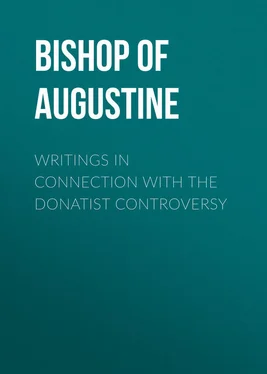Saint Augustine - Writings in Connection with the Donatist Controversy
Здесь есть возможность читать онлайн «Saint Augustine - Writings in Connection with the Donatist Controversy» — ознакомительный отрывок электронной книги совершенно бесплатно, а после прочтения отрывка купить полную версию. В некоторых случаях можно слушать аудио, скачать через торрент в формате fb2 и присутствует краткое содержание. Жанр: foreign_antique, foreign_prose, на английском языке. Описание произведения, (предисловие) а так же отзывы посетителей доступны на портале библиотеки ЛибКат.
- Название:Writings in Connection with the Donatist Controversy
- Автор:
- Жанр:
- Год:неизвестен
- ISBN:нет данных
- Рейтинг книги:3 / 5. Голосов: 1
-
Избранное:Добавить в избранное
- Отзывы:
-
Ваша оценка:
- 60
- 1
- 2
- 3
- 4
- 5
Writings in Connection with the Donatist Controversy: краткое содержание, описание и аннотация
Предлагаем к чтению аннотацию, описание, краткое содержание или предисловие (зависит от того, что написал сам автор книги «Writings in Connection with the Donatist Controversy»). Если вы не нашли необходимую информацию о книге — напишите в комментариях, мы постараемся отыскать её.
Writings in Connection with the Donatist Controversy — читать онлайн ознакомительный отрывок
Ниже представлен текст книги, разбитый по страницам. Система сохранения места последней прочитанной страницы, позволяет с удобством читать онлайн бесплатно книгу «Writings in Connection with the Donatist Controversy», без необходимости каждый раз заново искать на чём Вы остановились. Поставьте закладку, и сможете в любой момент перейти на страницу, на которой закончили чтение.
Интервал:
Закладка:
Chap. xiii. – 18. But who can fail to understand what they may be saying in their hearts? "What then are we to do," say they, "with those whom we have already rebaptized?" Return with them to the Church. Bring those whom you have wounded to be healed by the medicine of peace; bring those whom you have slain to be brought to life again by the life of charity. Brotherly union has great power in propitiating God. "If two of you," says our Lord, "shall agree on earth as touching anything that they shall ask, it shall be done for them." 108 108 Matt. xviii. 19.
If for two men who agree, how much more for two communities? Let us throw ourselves together on our knees before the Lord. Do you share with us our unity; let us share with you your contrition; and let charity cover the multitude of sins. 109 109 1 Pet. iv. 8.
Seek counsel from the blessed Cyprian himself. See how much he considered to depend upon the blessing of unity, from which he did not sever himself to avoid the communion of those who disagreed with him; how, though he considered that those who were baptized outside the communion of the Church had no true baptism, he was yet willing to believe that, by simple admission into the Church, they might, merely in virtue of the bond of unity, be admitted to a share in pardon. For thus he solved the question which he proposed to himself in writing as follows to Jubaianus: "But some will say, 'What then will become of those who, in times past, coming to the Church from heresy, were admitted without baptism?' The Lord is able of His mercy to grant pardon, and not to sever from the gifts of His Church those who, being out of simplicity admitted to the Church, have in the Church fallen asleep." 110 110 Cypr. Ep. lxxiii. to Jubaianus.
Chap. xiv. – 19. But which is the worse, not to be baptized at all, or to be twice baptized, it is difficult to decide. I see, indeed, which is more repugnant and abhorrent to men's feelings; but when I have recourse to that divine balance, in which the weight of things is determined, not by man's feelings, but by the authority of God, I find a statement by our Lord on either side. For He said to Peter, "He who is washed has no need of washing a second time;" 111 111 John xiii. 10. "Qui lotus est, non habet necessitatem iterum lavandi." The Latin, with the A.V., loses the distinction between ο λελουμινος , "he that has bathed ," and νιπτειν , to wash ; and further introduces the idea of repetition.
and to Nicodemus, "Except a man be born of water and of the Spirit, he cannot enter into the kingdom of God." 112 112 John iii. 5.
What is the purport of the more secret determination of God, it is perhaps difficult for men like us to learn; but as far as the mere words are concerned, any one may see what a difference there is between "has no need of washing," and "cannot enter into the kingdom of heaven." The Church, lastly, herself holds as her tradition, that without baptism she cannot admit a man to her altar at all; but since it is allowed that one who has been rebaptized may be admitted after penance, surely this plainly proves that his baptism is considered valid. If, therefore, Cyprian thought that those whom he considered to be unbaptized yet had some share in pardon, in virtue of the bond of unity, the Lord has power to be reconciled even to the rebaptized by means of the simple bond of unity and peace, and by this same compensating power of peace to mitigate His displeasure against those by whom they were rebaptized, and to pardon all the errors which they had committed while in error, on their offering the sacrifice of charity, which covereth the multitude of sins; so that He looks not to the number of those who have been wounded by their separation, but to the greater number who have been delivered from bondage by their return. For in the same bond of peace in which Cyprian conceived that, through the mercy of God, those whom he considered to have been admitted to the Church without baptism, were yet not severed from the gifts of the Church, we also believe that through the same mercy of God the rebaptized can earn their pardon at His hands.
Chap. xv. – 20. Since the Catholic Church, both in the time of the blessed Cyprian and in the older time before him, contained within her bosom either some that were rebaptized or some that were unbaptized, either the one section or the other must have won their salvation only by the force of simple unity. For if those who came over from the heretics were not baptized, as Cyprian asserts, they were not rightly admitted into the Church; and yet he himself did not despair of their obtaining pardon from the mercy of God in virtue of the unity of the Church. So again, if they were already baptized, it was not right to rebaptize them. What, therefore, was there to aid the other section, save the same charity that delighted in unity, so that what was hidden from man's weakness, in the consideration of the sacrament, might not be reckoned, by the mercy of God, as a fault in those who were lovers of peace? Why, then, while ye fear those whom ye have rebaptized, do ye grudge yourselves and them the entrance to salvation? There was at one time a doubt upon the subject of baptism; those who held different opinions yet remained in unity. In course of time, owing to the certain discovery of the truth, that doubt was taken away. The question which, unsolved, did not frighten Cyprian into separation from the Church, invites you, now that it is solved, to return once more within the fold. Come to the Catholic Church in its agreement, which Cyprian did not desert while yet disturbed with doubt; or if now you are dissatisfied with the example of Cyprian, who held communion with those who were received with the baptism of heretics, declaring openly that we should "neither judge any one, nor deprive any one of the right of communion if he differ from us," 113 113 See above, c. ii. 3.
whither are ye going, ye wretched men? What are ye doing? You are bound to fly even from yourselves, because you have advanced beyond the position where he abode. But if neither his own sins nor those of others could stand in his way, on account of the abundance of his charity and his love of brotherly kindness and the bond of peace, do you return to us, where you will find much less hindrance in the way of either us or you from the fictions which your party have invented.
BOOK THIRD
AUGUSTINE UNDERTAKES THE REFUTATION OF THE ARGUMENTS WHICH MIGHT BE DERIVED FROM THE EPISTLE OF CYPRIAN TO JUBAIANUS, TO GIVE COLOUR TO THE VIEW THAT THE BAPTISM OF CHRIST COULD NOT BE CONFERRED BY HERETICS.
CHAP. I. – 1. I think that it may now be considered clear to every one, that the authority of the blessed Cyprian for the maintenance of the bond of peace, and the avoiding of any violation of that most wholesome charity which preserves unity in the Church, may be urged on our side rather than on the side of the Donatists. For if they have chosen to act upon his example in rebaptizing Catholics, because he thought that heretics ought to be baptized on joining the Catholic Church, shall not we rather follow his example, whereby he laid down a manifest rule that one ought in no wise, by the establishment of a separate communion, to secede from the Catholic communion, that is, from the body of Christians dispersed throughout the world, even on the admission of evil and sacrilegious men, since he was unwilling even to remove from the right of communion those whom he considered to have received sacrilegious men without baptism into the Catholic communion, saying, "Judging no one, nor depriving any of the right of communion if he differ from us?" 114 114 See above, ii. ii. 3.
Chap. ii. – 2. Nevertheless, I see what may still be required of me, viz. that I should answer those plausible arguments, by which, in even earlier times, Agrippinus, or Cyprian himself, or those in Africa who agreed with them, or any others in far distant lands beyond the sea, were moved, not indeed by the authority of any general or even provincial Council, but by a mere epistolary correspondence, to think that they ought to adopt a custom which had no sanction from the ancient custom of the Church, and which was expressly forbidden by the most unanimous resolution of the Catholic world, in order that an error which had begun to creep into the minds of some men, through discussions of this kind, might be cured by the more powerful truth and universal healing power of unity coming on the side of safety. And so they may see with what security I approach this discourse. If I am unable to gain my point, and show how those arguments may be refuted which they bring forward from the Council and the epistles of Cyprian, to the effect that Christ's baptism may not be given by the hands of heretics, I shall still remain safely in the Church, in whose communion Cyprian himself remained with those who differed from him.
Читать дальшеИнтервал:
Закладка:
Похожие книги на «Writings in Connection with the Donatist Controversy»
Представляем Вашему вниманию похожие книги на «Writings in Connection with the Donatist Controversy» списком для выбора. Мы отобрали схожую по названию и смыслу литературу в надежде предоставить читателям больше вариантов отыскать новые, интересные, ещё непрочитанные произведения.
Обсуждение, отзывы о книге «Writings in Connection with the Donatist Controversy» и просто собственные мнения читателей. Оставьте ваши комментарии, напишите, что Вы думаете о произведении, его смысле или главных героях. Укажите что конкретно понравилось, а что нет, и почему Вы так считаете.












